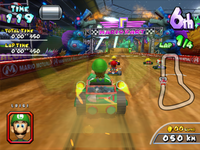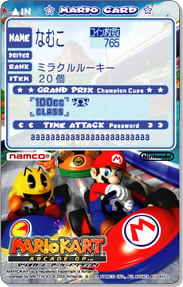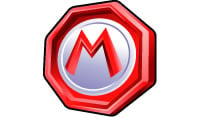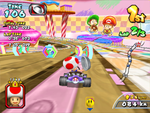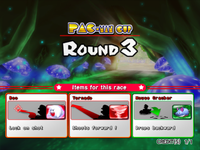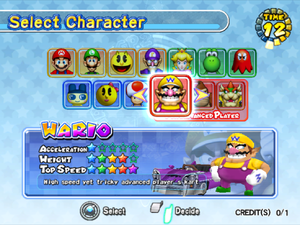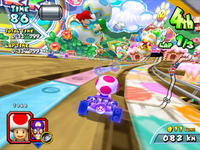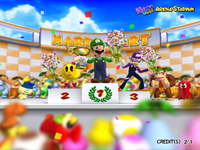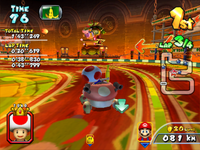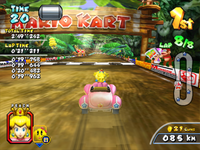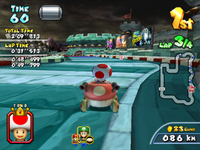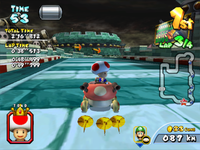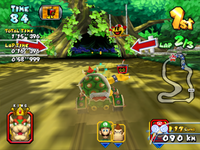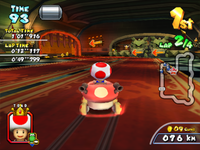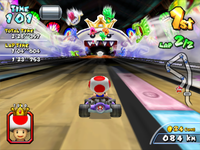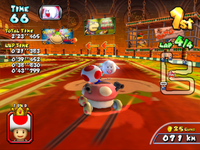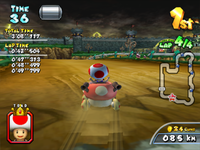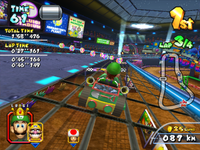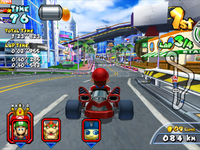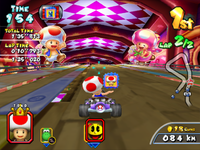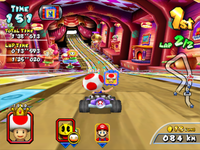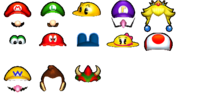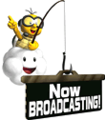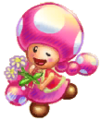Mario Kart Arcade GP 2
| Mario Kart Arcade GP 2 | |
|---|---|
 For alternate box art, see the game's gallery. | |
| Developer | Bandai Namco Amusement |
| Publisher | Bandai Namco Amusement[1] |
| Release date | Template:Release[?] |
| Genre | Racing |
| Mode(s) | Single-player, Multiplayer (VS), Time Trial |
| Cabinet | Sit down |
| Arcade system | Triforce |
| Monitor | 29" CRT |
| Input | Arcade: Joystick
|
Mario Kart Arcade GP 2 is the second game in the Mario Kart Arcade GP series and the seventh in the Mario Kart series overall. It is a follow-up to Mario Kart Arcade GP, and was later followed by Mario Kart Arcade GP DX. The game has custom karts for characters, similar to Mario Kart: Double Dash!! and Mario Kart DS. It contains virtually all the content of the original, but greatly expands it with the addition of several new courses, items and racers. Like the predecessor, Pac-Man characters appear as playable in this game. The game also introduces Mametchi as a playable character. In-game, it appears to be broadcast live and has color-commentary of the player by a narrator, whose language depends on the region of the game.
How To Play
First, players can adjust their seat within the time limit by moving a lever near their feet and sliding to any position on the arcade machine. After that happens, players can choose a character to play as. Then, players can take a picture of themselves using the camera lens within the time limit; if the player does not take the picture, a countdown starts to force the player to take it. On some instances, the camera cannot be used. The picture of the current character is instead used.
When the race starts, the players' object is to finish in 1st place. If they get a lower place, they must retry to unlock the course by giving the game certain money or some tokens. If players get 1st place, they can continue if they pay the game another token or dollar(s). If not, the game is over.
Controls
- Accelerate - Accelerator pedal
- Brake - Brake pedal
- Item - ITEM button on center of steering wheel.
- VS Cancel - VS CANCEL button right of the steering wheel
- Mario Card holder - Mario Card slot on the bottom right of the screen
- Money holder - Money slot under Mario Card slot
Techniques
Rocket Start
The player can get a rocket start when the accelerator is pressed right when "1" is displayed. If successful, the kart gets a small speed boost when the race starts. The method of performing the rocket start closely resembles the one from Mario Kart: Double Dash!!
Jumping and Drifting
Jumping is performed if the brake pedal is pressed quickly and drifting occurs if the brake pedal is tapped twice.
Mario Card
A Mario Card is the data card (or save file) that appears was copied from Mario Kart Arcade GP and appears in Mario Kart Arcade GP 2. It appears in all sorts of different colors and designs.
Features
- The player's chosen nickname
- The player's amount of coins
- The player's rank
- The player's item (e.g. 70 SP Item Get!, 64)
- The player's amount of VS wins (if any)
- The card's password for the Internet Rankings
- The player's completed GP cups and class
Modes
Grand Prix
In Grand Prix, the player races against five computer drivers for winning the trophies in every race. The goal of each race is to finish in first place within the time limit (if the player is in first place and then times out rather than finishing, the round will not count as completed). There are three engine levels available: 50cc, 100cc, and 150cc, and as with the previous Mario Kart installments, is linear with the difficulty - 50cc being the slowest (Easy), 100cc being the standard (Normal) and 150cc being the fastest (Master). There are 4 difficulty levels, and each one has two stages. Each cup has 2 tracks, separated into 4 rounds. The first 2 rounds are the tracks in normal conditions, and the last 2 rounds the same tracks in different conditions (e.g. DK Jungle changes to rain). After having completed each round, the player receives a challenge, similar to the Mission Mode that appears in Mario Kart DS. Unlike the previous game, clearing the challenge is not necessary to complete a cup. Also, when the player is using a Mario Card, the player receives Mario Coins depending on their performance, up to a maximum of 15. Extra mode makes a return, only under the name of Special Cup (Reverse mode). In initial gameplay, a player can select the next round only after winning the first round. When the players completes all 4 rounds, they can play a "challenge game" stage.
Time Attack
In Time Attack mode, the user tries to get the fastest time on the tracks. To select Time Attack, the player must hold VS Cancel while selecting a class (50cc is not available in Time Attack). The player starts with 3 Mushrooms in Time Attack, and the number of coins on track is reduced to ten during 150cc Time Attack (compared to 25 in 100cc Time Attack).
A difference in the HUD between this game and the first game is that the remaining time is moved to the top-right and the total time is made larger and moved all the way to the top-left. There is no commentary during Time Attack games.
VS
After the players insert coins, the machine starts a search for VS races. If players are found, the game starts a VS Match. Like the previous game, up to four players can play together. In VS, the players first select an engine class, select a character, takes a picture (if necessary), then votes for a course. After, each player will be given 3 random items. Unlike the previous game, in multiplayer mode players in the minimap are given colors depending on their player number: Player 1 is red; Player 2 is orange; Player 3 is green; Player 4 is blue; and CPUs are dark blue. If fewer than four players gather for a race then CPU drivers are added to make up four racers.
During the race, the bottom-left screen displays the player number (unlike the first game, which did not do so), and there is no speedometer in the bottom-right, just showing the coin count (just like the first game did). Also, the commentator says the player number before the character's name except for CPU-controlled karts.
When the race is over, players can choose if they want to continue with the same opponents or not. If two or more players decide to continue, the selection process restarts from the very beginning (players select a class first unlike in single player where the class and mode is not re-selected). If only one player decides to continue, it will change to a Grand Prix/Time Attack game for that player (this time only where the player selects the class and mode, before character select).
Mario Coins and Coins
Mario Coins are coins that the player can pick up in Mario Kart Arcade GP 2. If the player gains enough Mario Coins and regular Coins, they can unlock prizes to save on their Mario Card (e.g. new karts, special items). Upon collecting 4000 Mario Coins, players will unlock the ability to change to a first-person perspective akin to that of Mario Kart 7. This is done by pressing the VS Cancel button during a race.
Item Boxes
Mario Kart Arcade GP 2 does not feature the normal cube item boxes seen in previous games; it comes with multi-colored, hexagonal item boxes. They have a white question mark while Jack-in-the-boxes (fake Item Boxes) have a white, upside-down question mark. When taken, they instantly regenerate, unlike the other Mario Kart games, in which they take a while.
Basic Items
Unlike in the typical Mario Kart games, items are grouped into these categories: locking-on, passing the item, dropping backward, and shooting forward. Locking-on item involves a moving cursor that stops if it goes over an opponent. If the cursor is locked-in for enough time, the cursor flashes red and the thrown item locks into the player, similar to a Red Shell. Passing items require the item to be thrown, much as a locking-on item. Afflicted players need to collide with other players to evade the hindering effects. Items that drop backward and items that shoot forward act similarly to items in the traditional Mario Kart games.
Unlike in most Mario Kart games, these items can be thrown in only one direction. Also unlike most Mario Kart games, only certain items appear during a race. Three of them are shown before the race starts. Most of these items have a temporary after-effect that can hinder the affected driver.
Characters
All playable characters from Mario Kart Arcade GP return along with two new characters, Waluigi and a Tamagotchi named Mametchi. They all have two karts available: a standard go-kart and a personal kart that increases speed, but reduces acceleration.
Balanced
| Character | Special Kart | Standard Kart |
|---|---|---|
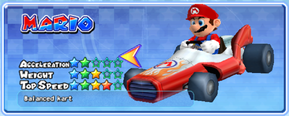
|
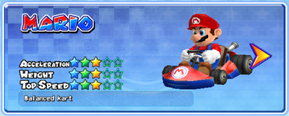
| |
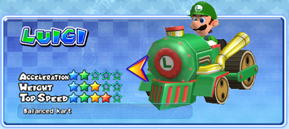
|
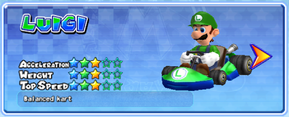
| |
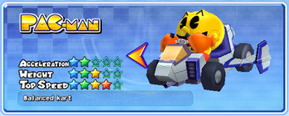
|
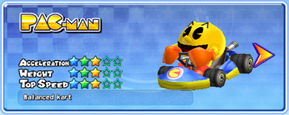
| |
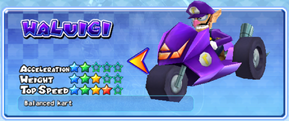
|
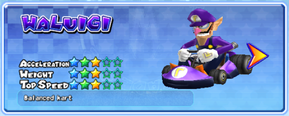
|
Strong Acceleration
| Character | Special Kart | Standard Kart |
|---|---|---|
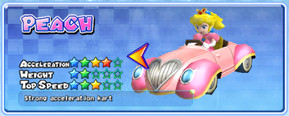
|
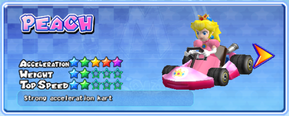
| |
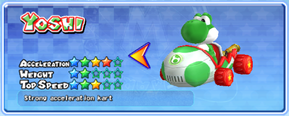
|
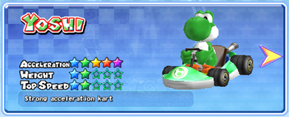
| |
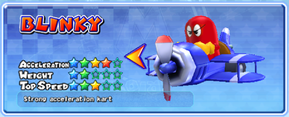
|
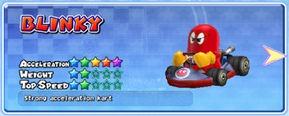
|
Easy Control
| Character | Special Kart | Standard Kart |
|---|---|---|
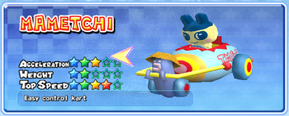
|
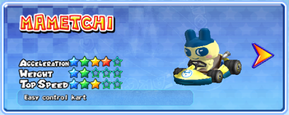
| |
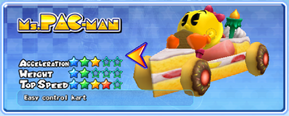
|
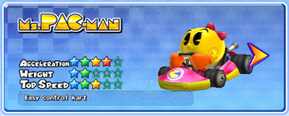
| |
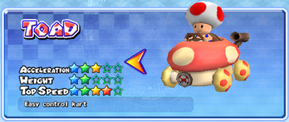
|
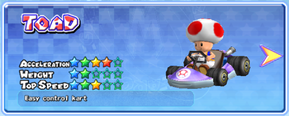
|
High Speed
| Character | Special Kart | Standard Kart |
|---|---|---|
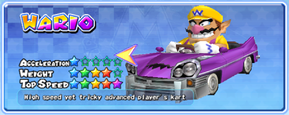
|
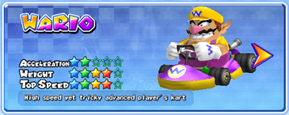
| |
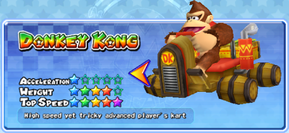
|
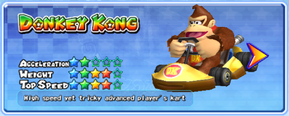
| |
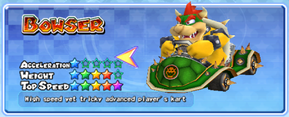
|
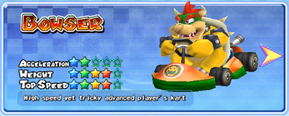
|
- Additionally, the Rainbow Cup challenge game features players trying to reach the finish line before a nonplayable Robo Mario.
Cameo appearances
Although these characters are not playable in Mario Kart Arcade GP 2, they all make small cameos somewhere in the game, either from a sponsor or seen in a course.
Faces
Mario Kart Arcade GP 2 features 'faces'. These are the borders around the players face when the player gets their photo taken. Players can also get special, character specific faces if they choose to play as that character. If no picture is taken, then the default face shows the character's mugshot.
Internet Rankings
Mario Kart Arcade GP 2, along with Mario Kart Arcade GP, featured Internet Rankings. It was run by Bandai Namco Entertainment Japan, and a Mario Card was required. These were located at:
Courses
Mario Kart Arcade GP 2 brings back all courses from the original Mario Kart Arcade GP and adds four new courses into two cups. There are eight cups in total, each one with two tracks and a challenge in the final. The cups are organized into 4 rounds, the first 2 rounds are the tracks in normal conditions, and the last 2 rounds the same tracks in different conditions, like rain in DK Jungle.
After finishing all four races from each stage, a Challenge Game comes up, in which the player is not required to complete for winning the cup. Each of them requires the player to drive to a goal under a certain amount of time while under a certain condition, such as driving backwards through a road of banana peels.
Winning all cups, the player unlocks advanced courses, the Mirror Mode.
Easy
Yoshi Cup | ||||
|---|---|---|---|---|
Yoshi Park 1 |
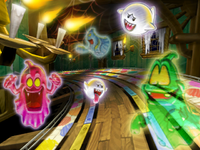 Yoshi Park 2 |
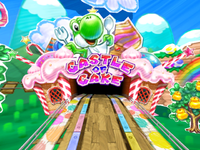 Yoshi Park 1 |
 Yoshi Park 2 |
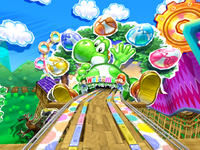 Coin Collector |
Mario Cup | ||||
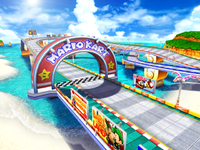 Mario Highway |
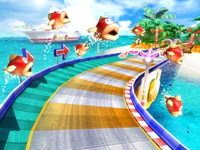 Mario Beach |
Mario Highway |
Mario Beach |
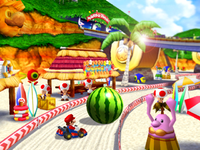 Move Giant Watermelon! |
Normal
Waluigi Cup | ||||
|---|---|---|---|---|
Stadium Arena |
Waluigi Stadium |
Stadium Arena |
Waluigi Stadium |
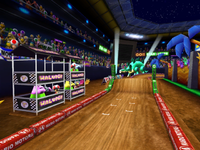 Bird Kart Contest! |
DK Cup | ||||
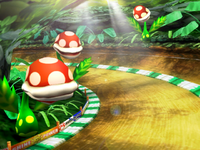 DK Jungle |
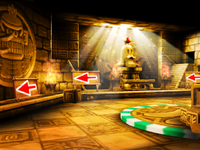 Bananan Ruins |
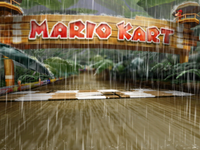 DK Jungle |
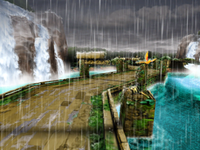 Bananan Ruins |
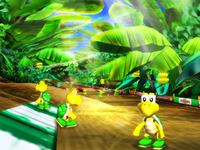 Koopa Panic! |
Wario Cup | ||||
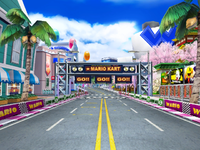 Diamond City |
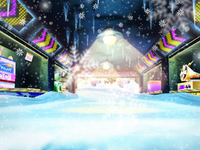 Snow Panic |
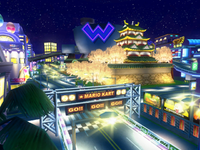 Diamond City |
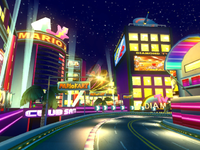 Snow Panic |
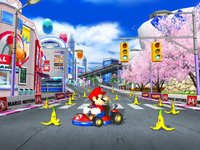 Backward Race |
Master
Pac-Man Cup | ||||
|---|---|---|---|---|
Pac Mountain |
Pac Labyrinth |
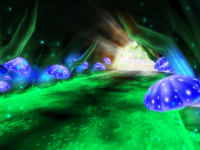 Pac Mountain |
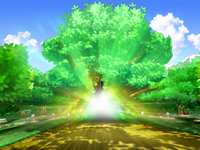 Pac Labyrinth |
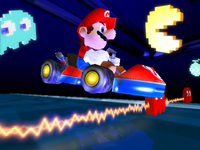 PAC Challenge! |
Bowser Cup | ||||
Bowser's Castle |
Castle Wall |
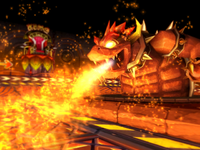 Bowser's Castle |
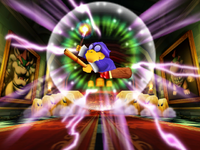 Castle Wall |
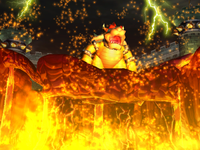 Final Battle with Bowser! |
Rainbow Cup | ||||
Rainbow Coaster |
Rainbow Downhill |
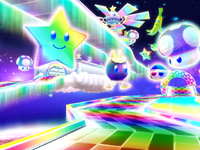 Rainbow Coaster |
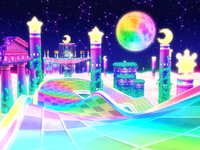 Rainbow Downhill |
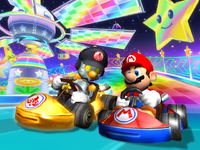 1 vs 1 Battle with Robo Mario! |
Staff
- Main article: List of Mario Kart Arcade GP 2 staff
Gallery
- For this subject's image gallery, see Gallery:Mario Kart Arcade GP 2.
Bowser Jr.'s sponsor
Media
| It has been requested that more audio and/or video files related to this section be uploaded. Specifics: At least two more music samples Please upload all related music, sound effects, voice clips, or any videos for this section. See the help page for information on how to get started. |
References to other games
- Super Mario Bros.: The menu theme includes a remix of the overworld theme from this game. Also, when losing a race, an arrangement of the death jingle plays.
- Super Mario World 2: Yoshi's Island: Yoshi Park 1's theme is heavily based on this game.
- Wario Land 4: The Wario Car is one of Wario's karts.
- Luigi's Mansion: Yoshi Park 2 features a Luigi's Mansion-based attraction, complete with the generic ghosts from said game and King Boo.
- WarioWare series: The central location of the series, Diamond City, appears as a racetrack.
- Mario Kart: Double Dash!!: Some sound and voice effects have been borrowed from this game, such as the start signal sound effect.
- Mario Kart Arcade GP: All the assets from the original game are re-used with slight enhancements.
- Mario Kart DS: The Egg Rider resembles the Egg 1, Mario's Special Kart resembles the B Dasher, and the Mash Run resembles the Mushmellow.
References in later games
- Mario Kart Tour: The Mario team tokens resemble the Mario Coins.
Names in other languages
| Language | Name | Meaning | Notes |
|---|
Trivia
- This is the last installment of the Mario Kart series to use the series' original logo font in the game's title.
